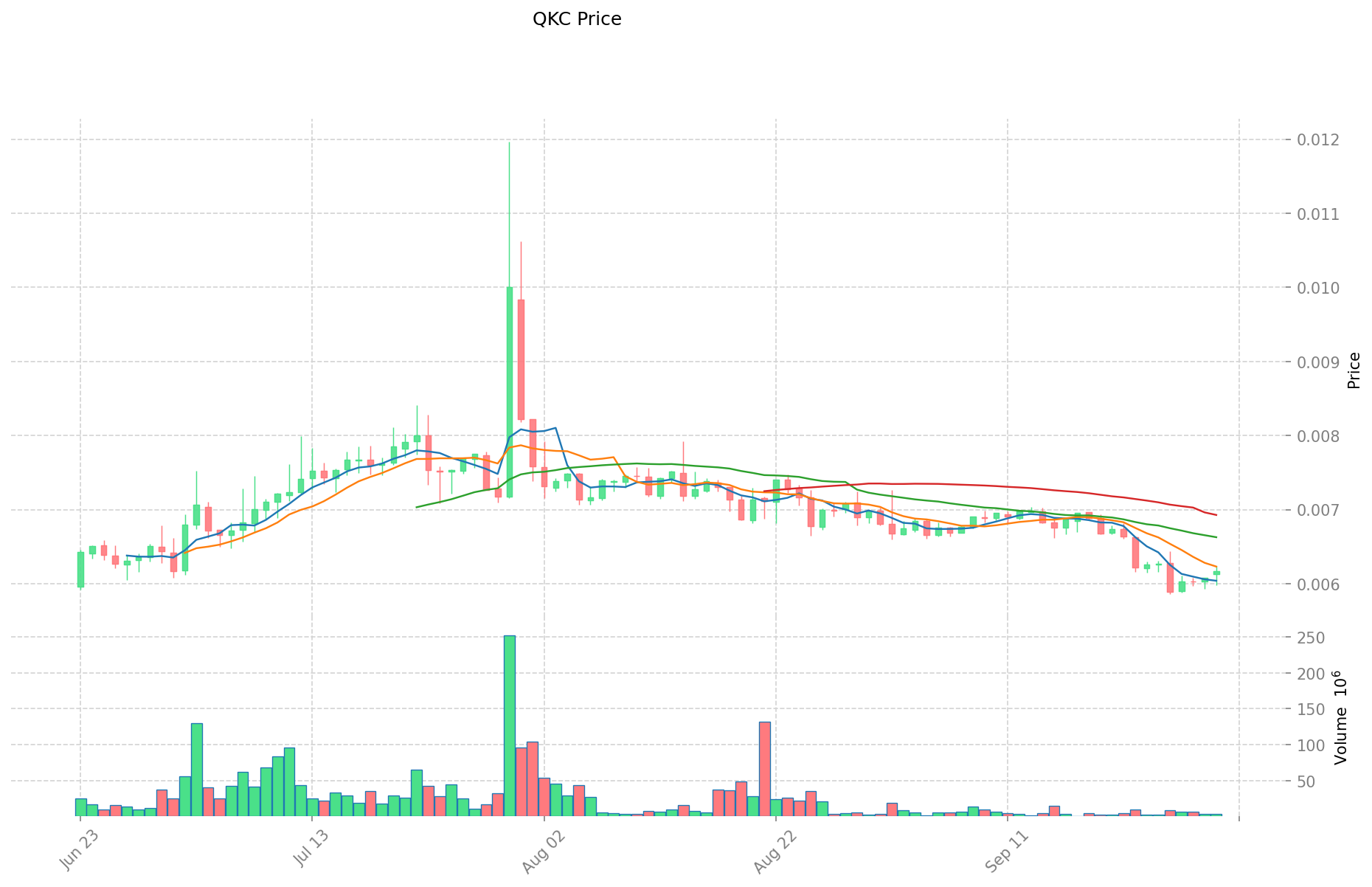What is QKC: A Comprehensive Guide to QuarkChain Cryptocurrency and Its Revolutionary Blockchain Technology
QuarkChain's Positioning and Significance
In 2018, QuarkChain (QKC) was launched to address the scalability issues in blockchain technology. As a high-capacity peer-to-peer transactional system, QuarkChain plays a crucial role in the blockchain infrastructure sector.
As of 2025, QuarkChain has established itself as a notable player in the blockchain scalability solutions market, boasting a transaction processing capacity of over 100,000 TPS. This article will delve into its technical architecture, market performance, and future potential.
Origin and Development History
Birth Background
QuarkChain was created in 2018 to tackle the scalability challenges faced by existing blockchain networks. It emerged during the blockchain technology boom, aiming to provide a secure, decentralized, and highly scalable solution. QuarkChain's introduction brought new possibilities for blockchain applications requiring high throughput.
Important Milestones
- 2018: Mainnet launch, achieving high transaction processing capacity.
- 2025: Continued optimization of its technology, security, and real-world applications with community support.
How Does QuarkChain Work?
No Central Control
QuarkChain operates on a decentralized network of computers (nodes) spread globally, free from control by banks or governments. These nodes collaborate to validate transactions, ensuring system transparency and attack resistance, granting users greater autonomy and enhancing network resilience.
Blockchain Core
QuarkChain's blockchain is a public, immutable digital ledger that records every transaction. Transactions are grouped into blocks and linked through cryptographic hashes to form a secure chain. Anyone can view the records, establishing trust without intermediaries. QuarkChain's sharding technology further enhances performance.
Ensuring Fairness
QuarkChain uses a consensus mechanism to validate transactions and prevent fraudulent behaviors like double-spending. Participants maintain network security through their activities and receive QKC rewards. Its innovation includes higher TPS compared to traditional blockchain networks.
Secure Transactions
QuarkChain utilizes public-private key encryption to protect transactions:
- Private keys (like secret passwords) are used to sign transactions
- Public keys (like account numbers) are used to verify ownership
This mechanism ensures fund security while maintaining transaction privacy. QuarkChain's sharding technology adds an extra layer of security and scalability to the network.
QuarkChain's Market Performance
Circulation Overview
As of September 30, 2025, QuarkChain's circulating supply is 7,165,633,478 QKC, with a total supply of 10,000,000,000 QKC.
Price Fluctuations
QuarkChain reached its all-time high of $0.338765 on June 5, 2018. Its lowest price was $0.00137714, recorded on March 13, 2020. These fluctuations reflect market sentiment, adoption trends, and external factors.
Click to view the current QKC market price

QuarkChain Ecosystem Applications and Partnerships
Core Use Cases
QuarkChain's ecosystem supports various applications:
- DeFi: Decentralized finance projects leveraging QuarkChain's high throughput.
- dApps: Various decentralized applications benefiting from QuarkChain's scalability.
Strategic Collaborations
QuarkChain has established partnerships to enhance its technical capabilities and market influence. These partnerships provide a solid foundation for QuarkChain's ecosystem expansion.
Controversies and Challenges
QuarkChain faces the following challenges:
- Technical Hurdles: Ensuring the promised high transaction processing capacity (100,000+ TPS) is consistently delivered.
- Regulatory Risks: Navigating the evolving regulatory landscape for blockchain projects.
- Competitive Pressure: Standing out in a crowded field of blockchain solutions offering high scalability.
These issues have sparked discussions within the community and market, driving continuous innovation for QuarkChain.
QuarkChain Community and Social Media Atmosphere
Fan Enthusiasm
QuarkChain's community shows vitality, with growing transaction volumes and wallet addresses. On X, posts and hashtags related to QuarkChain often trend, indicating active community engagement.
Social Media Sentiment
Sentiment on X presents a mixed picture:
- Supporters praise QuarkChain's high throughput and scalability, viewing it as a promising solution for blockchain scalability.
- Critics focus on challenges in achieving widespread adoption and competing with established blockchain networks.
Recent trends show increased interest in QuarkChain's technological advancements.
Hot Topics
X users actively discuss QuarkChain's sharding technology, its potential to solve blockchain scalability issues, and its position in the competitive landscape of high-performance blockchains.
More Information Sources for QuarkChain
- Official Website: Visit QuarkChain's official website for features, use cases, and latest updates.
- White Paper: QuarkChain's white paper details its technical architecture, goals, and vision.
- X Updates: On X, QuarkChain uses @Quark_Chain, covering topics such as technical upgrades, community events, and partnership news.
QuarkChain Future Roadmap
- Technical Goals: Further improvements in sharding technology and transaction processing capacity.
- Ecosystem Objectives: Expanding the number of dApps and users on the QuarkChain network.
- Long-term Vision: Becoming a leading blockchain infrastructure for high-throughput applications.
How to Participate in QuarkChain?
- Purchase Channels: Buy QKC on Gate.com
- Storage Solutions: Use secure wallet solutions compatible with QKC
- Participate in Governance: Engage in community decisions through QuarkChain's governance mechanisms
- Build on the Ecosystem: Visit QuarkChain's developer documentation to develop dApps or contribute code
Summary
QuarkChain redefines blockchain technology by offering high throughput and scalability through its sharding approach. Its active community, rich resources, and strong technological foundation give it a unique position in the cryptocurrency field. Despite facing challenges in a competitive blockchain landscape, QuarkChain's innovative spirit and clear roadmap secure its place in the future of decentralized technologies. Whether you're a newcomer or an experienced player, QuarkChain is worth watching and participating in.
FAQ
What is a QKC designation?
QKC designation signifies expertise in 401(k) plan design. It complements the QKA and prepares individuals for consultative roles in retirement planning.
What is QKC coin?
QKC is a cryptocurrency built on QuarkChain, a high-capacity peer-to-peer transactional system designed for fast, secure, and decentralized blockchain solutions.
What is Elon Musk's crypto coin?
Elon Musk doesn't have his own crypto coin. He's known for supporting Dogecoin (DOGE), but hasn't launched an official cryptocurrency.
What is the future of QuarkChain?
QuarkChain's future looks promising, with projections indicating a maximum price of $0.023939 by 2025. Market trends suggest continued growth and adoption in the blockchain space.
Share
Content